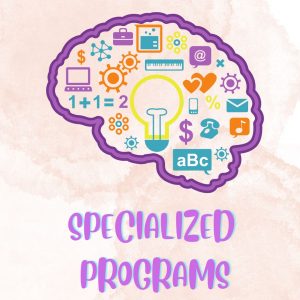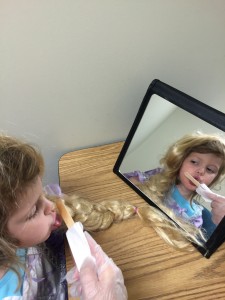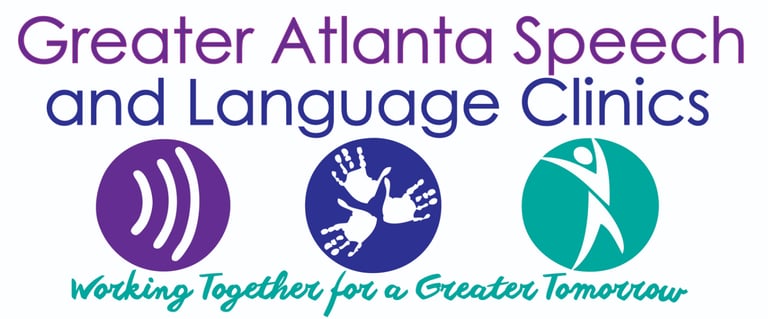Specialized Programs


PROMPT
“PROMPT, an acronym for PROMPTS for Restructuring Oral Muscular Phonetic Targets, is a multidimensional approach to speech production disorders that embraces not only the well-known physical-sensory aspects of motor performance, but also its cognitive-linguistic and social-emotional aspects. PROMPT is about integrating all domains and systems towards positive communication outcome. It may be used (with varying intensity and focus) with all speech production disorders from approximately 6 months of age onward. PROMPT is a program to develop motor skill in the development of language for interaction.” (See Link to More Information)
Lindamood Phoneme Sequencing Program for Reading, Spelling, and Speech (LiPS)
“The LiPS® Program is the development of an oral-motor, visual, and auditory feedback system that enables all students to prove the identity, number, and order of phonemes in syllables and words. It is more basic and more extensive than traditional phonics programs. The LiPS® Program teaches students to discover and label the oral-motor movements of phonemes. Students can then verify the identity, number, and sequence of sounds in words. Once established, phonemic awareness is then applied to reading, spelling, and speech.” (See Link for More Information)
Visualizing and Verbalizing Program for Cognitive Development, Comprehension, and Thinking
“A primary cause of language comprehension problems is difficulty creating an imagined gestalt. This is called weak concept imagery. This weakness causes individuals to get only “parts” of information they read or hear, but not the whole. The Visualizing and Verbalizing® (V/V®) program develops concept imagery—the ability to create an imagined or imaged gestalt from language—as a basis for comprehension and higher order thinking. The development of concept imagery improves reading and listening comprehension, memory, oral vocabulary, critical thinking, and writing.” (See Link for More Information)
Myofunctional Therapy
Myofunctional therapy is the retraining of the oral and facial musculature to correct the tongue’s position at rest and/or during the swallow. The therapy includes oral exercises and behavior modification techniques to promote correct tongue position at rest and during the swallow. If necessary, it will focus on improving chewing and bolus formation in preparation for a correct swallow. Correct swallowing depends on a proper relationship between all oral-facial musculature. Because a person swallows approximately 1000 times a day, improper swallowing can cause a variety of problems. The resting position of the tongue can also cause problems because of the constant forward pushing pattern.
SOS Approach to Feeding
The Sequential Oral Sensory (SOS) feeding approach integrates motor, oral, behavioral/learning, medical, sensory and nutritional factors and approaches in order to comprehensively evaluate and manage children with feeding/growth concerns. The SOS feeding therapy approach is based on typical developmental feeding steps (See Link for More Information), stages and skills found in children. The SOS approach focuses on quality over quantity, the aim is to refine and develop feeding skills that are needed to be a successful, safe eater.
CAN-EAT: Using medical, motor, and therapeutic strategies in pediatric feeding
CAN = Comfort and Nutrition- gut comfort and proper nutrition and growth comes first. This includes medical and nutritional intervention for reflux, constipation, food intolerance, and hypersensitivity/pain issues, swallowing.
EAT =Establish Acceptance of dry spoon or easy textures, then Therapy for oral motor skill development and improving volume and variety of intake.
The TR-eat® Model
The TRansdisciplinary Effective Assessment and Treatment (TR-eat®) model melds medical management, skill building and behavioral interventions to create a distinctive treatment method with outstanding outcomes for children with complex feeding problems. Treatment is a child guided rather than child directed. Therapists observe subtle signs from the child to find the “just right challenge” to work within. There is structure; however, treatment is advanced at a rate where the child is able to develop skills and confidence.
Talk Tools: A Sensory-Motor Approach
The talk tools sensory-motor approach model addresses the complex issues surrounding feeding. It uses an understanding of the impact sensory processing and motor skills can have on feeding. The approach uses pre-feeding exercises designed to develop the motor skills for safe, effective, nutritive feeding and therapeutic feeding techniques.


Contact Us


Main Clinic Building
1515 Johnson Ferry Road
Suite 100
Marietta, GA 30062
OT / PT Annex
1503 Johnson Ferry Road
Terrace Level
Marietta, GA 30062
Appointment Request: Click Here
Phone: (770) 977-9457
Fax: (770) 977-5087
Email: greateratlantaspeech@gmail.com
